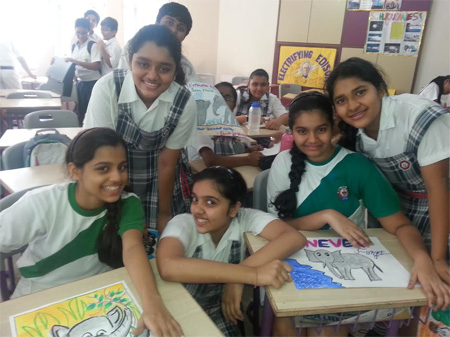New Delhi, May 22, 2014: Three students from South India and seven others have been declared winners and runners-up for the national level painting competition on the theme ‘Elephants, Never Forget’, organised as part of the International Fund for Animal Welfare – Wildlife Trust of India’s Animal Action Education (AAE) programme.
Announced today by IFAW-WTI commemorating the occasion of the International Day for Biological Diversity, the ten winners were selected from 7500 entries received from across the country. More than 50000 students participated in the AAE in India last year, representing nearly 1000 schools.
The winning students from India were B Abinaya of Bala Vidya Mandir, Chennai, S Sachin of St Joseph’s Central School, Mysore and K Sashi Kanth of Bhartiya Vidya Bhavan Public School, Hyderabad who bagged the first, second and third prize respectively. Seven other students from the National Capital Region, Jharkhand and Assam were awarded consolation prizes for their efforts.
Congratulating the winning students, Bulbul Sharma, renowned artist who judged the competition said, “It is very important for children to paint on themes related to nature. This is how they learn to see its various aspects properly and not just on the surface. When they draw an elephant or a tiger or a tree, they form a bond with it which they will always respect and protect.”
An initiative of IFAW, AAE – the world’s largest animal themed educational activity –draws participation from millions of children from over 18 countries, including India. Free activity packs comprising information and guidelines for coordinators and a documentary film is provided to participating schools. The schools then conduct a range of activities through the year, beginning with the Wildlife Week, using these packs.

“It has a new global theme every two years, but considering the relevance of tigers and elephants in India, we have continued to use the activity packs on these animals,” said Rupa Gandhi Chaudhury, Chief Marketing Officer, WTI. “The activity packs have been translated into multiple languages to extend reach, and we have received support of numerous agencies and volunteers who helped us conduct AAE in their respective localities. We would like to extend our gratitude to all these supporters, and to the schools who took the initiative to spread awareness among their students.”
Among the volunteers/NGOs who helped implement the AAE included Nilgiri Foundation, Seven look, Parikrama Foundation, Mahiru Foundation, and Rotary International Gujarat.